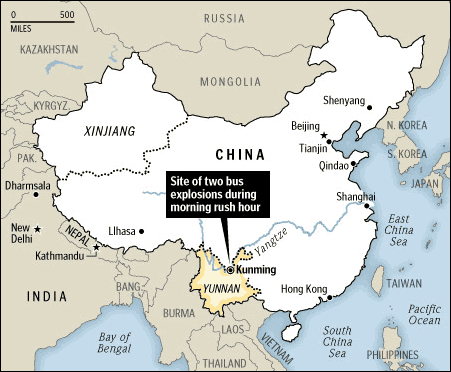http://www.cbc.ca/news/world/story/2012 ... china.html
Soil contamination concerns
China also has problems with soil contamination from arsenic and other heavy metals from mines and factories. Zhou Jianmin, director of the China Soil Association, told the Guardian last month that he estimated that one-tenth of China’s farmland was affected. Soil contamination could have potentially dire consequences for food production and human health, scientists told the Guardian
"The country, the government and the public should realize how serious the soil pollution is,” Jianmin said. “More areas are being affected, the degree of contamination is intensifying and the range of toxins is increasing."
Water pollution is also a growing challenge. China's own government has admitted that about 14 per cent of China's water sources had unqualified drinking water and that 11.4 per cent of water supplies to cities were unsafe.
Government statistics from 2009 reveal that nearly 20 per cent of the length of China's monitored rivers and lakes had pollution worse than Grade 5, making the water officially unfit for even irrigating crops, Reuters reported.
The concern now is that the health impact from pollution is chipping away at the economic gains made due to industrialization.
http://www.guardian.co.uk/environment/2 ... -challenge
Other estimates of soil pollution range as high as 40%, but an official risk assessment is unlikely to be made public for several years.
The government has spent six years on a soil survey involving 30,000 people, but the academics leading the project said they have been forbidden from releasing preliminary findings.
Chen Tongbin of the Chinese Academy of Sciences said the worst contamination was in Yunnan, Sichuan, Hunan, Anhui and Guizhou, but there were also parts of Beijing where the soil is tainted.
Unlike in Europe where persistent organic pollutants are the main concern, Chen said China's worst soil contamination is from arsenic, which is released during the mining of copper, gold and other minerals. Roughly 70% of the world's arsenic is found in China – and it is increasingly coming to the surface with horrendous consequences.
"When pollution spills cause massive die-offs of fish, the media usually blames cadmium, but that's wrong. Arsenic is responsible. This is the most dangerous chemical," he said. The country's 280,000 mines are most responsible, according to Chen.
But the land – and food chain – are also threatened by lead and heavy metals from factories and overuse of pesticides and fertilisers by farmers. The risks are only slowly becoming well known. The Economic Information Daily reported this week that pollution ruins almost 12bn kilograms of food production each year, causing economic losses of 20 billion yuan.
Chen estimated that "no more than 20% of China's soil is seriously polluted", but he warned that the problem was likely to grow because 80% of the pollutants in the air and water ended up in the earth.
http://www.china.org.cn/environment/201 ... 629451.htm
Hundreds of severe pollution incidents have occurred across China since 2008, includes 30 incidents of heavy metal pollution.
The Liuyang cadmium pollution incident in Hunan Province in 2009 had polluted the surrounding farmlands and forests, resulting in two deaths and 500 more to be detected with excessive cadmium in their bloodstreams. Heavy metal cadmium is an extremely toxic chemical element commonly found in industrial workplaces, particularly where any ore is being processed or smelted.
The amount of grain contaminated by heavy metal is as high as 12 million tons, causing direct economic loss of over 20 billion yuan (over US$317 million), estimated by department of environmental protection.
Over-the-limit amount of heavy metal cadmium has found in 10 percent of rice in the Chinese market, according to a nationwide survey by Pan. He said: "The cadmium-filled rice carries fatal health risks to self-sufficient farmers."
Elements of heavy metal found in farmlands can severely affect children's growth and even cause cancer.
Similarly, pesticide and chemical fertilizers as also pose serious threats to the public's health. As much as 1.3 million tons of pesticide is being used by China's agricultural industry, 2.5 times that of the world average. What's worse: Over 99.9 percent of the total usage of pesticide does nothing but pollute the farming products and the environment, and only 0.1 percent is effective for the elimination of diseases and pests, according to studies by Yunnan Agricultural University.
"The pollution is spreading," Pan said. The toxic chemicals in the soil have been found in agricultural and material processing industries, in urban and rural areas, and in surface and subsurface layers. They have also been detected in areas along river streams from upstream to downstream, and the water and soil contaminant had led to the manufacturing chain of China's food supplies, which could explain the frequency of pollution incidents.





